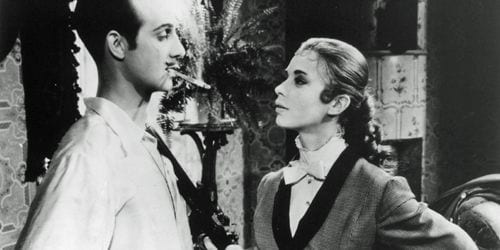
The difference between who Ingmar Bergman was and who audiences imagined he’d be is never more striking than when listening to the behind the scenes stories about the making of Smiles of a Summer Night. The film often seems odd when juxtaposed with the rest of Bergman’s canon. Not only is it a comedy, it’s also deliriously romantic. Considering Bergman became notorious for his raw, metaphysical dramas and his exposure of god’s silence, this film about mismatched couples and horny servants seems almost “light”.
Yet take a closer look and it’s all there: the deeply embedded melancholy, the longing for answers that might never come, the exquisite performances (especially by actresses), the strange feeling of emptiness…as Woody Allen once said referring to The Seventh Seal, his films were “hardly anyone’s idea of a good time”, but somehow they were. Smiles of a Summer Night in particular forces the viewer, especially those familiar with Bergman’s latter work, to reexamine their preconceptions about his work. Not only is this one of the funniest films ever made, it’s also a perfect example of transcendental comedy.
How the film came to happen makes for an even more puzzling situation. Bergman had been warned by his studio that they’d stop funding his films if he didn’t deliver a commercial success. He became ill, was going through a tumultuous relationship and had no money left. This is what one would imagine the filming of Cries and Whispers to have been like, yet instead in his darkest films, he was making jokes and gossiping about the actors’ sex lives. The director’s creative juices seemed to be flowing inversely than what you’d expect and from his depression sprang Smiles of a Summer Night.
The plot revolves around the lives of six people: lawyer Fredrik Egerman (Gunnar Björnstrand), his young virginal wife Anne (Ulla Jacobsson) and Egerman’s religious son Henrik (Björn Bjelfvenstam) who has feelings for his stepmother. Then there’s theater actress and Fredrik’s former mistress Desiree Armfeldt (Eva Dahlbeck), her current lover Count Carl Magnus Malcolm (Jarl Kulle) and his icy wife Charlotte (Margit Carlqvist). Over the course of a summer night, which seems to have been dreamt up by Moliere and Shakespeare, in Desiree’s mother’s (Naima Wifstrand) country estate, these six will end up forming three couples.
The scenes leading to the country house are filled with memorable moments, including an encounter between Fredrik and Carl in Desiree’s house and a harsh, almost cruel conversation between Anne and Charlotte. By the time the six characters are thrown together in the estate, tensions are boiling to such a point, that we wonder how Bergman will deal with all of them. Yet deftly, with an almost godly purpose, the filmmaker takes them towards pleasing resolutions that must have been delineated carefully, but seem to reach their conclusion almost preternaturally.
The film is filled with rich detail and little moments during which Bergman’s dialogues truly shine. “Our superb trysts aside, you are my only friend” says a vulnerable Fredrik to the delicious Desiree who minutes later has congratulated him for looking “unusually human”. This dichotomy between love and hate, gives the film a sensuous feeling. We often wonder if the characters carry so much pain, that their quips and denigration of each other are the only way they have to exorcise it.
“Are you prepared to be frank?” asks Charlotte to Desiree in another scene, to which she replies “Why not? We are enemies after all”. Bergman’s sexual politics wouldn’t be discussed such openly for decades, since after this film he went straight for the soul, exploring and dissecting its essence in films like Wild Strawberries and Persona. This is why in retrospect, Smiles of a Summer Night feels like an almost happy accident.
Bergman cast the theater actors he was working with in a play (which explains why the troupe feels so organic together), went with his usual cinematographer, Gunnar Fischer and employed not much of a conscious effort into turning this into the film it eventually became. Fischer’s cinematography is particular for its use of white. The restoration and high definition conversion of this Criterion release makes the film feel like a “white and black” movie, given how textured and milky, Fischer’s work is. Besides his work with lighting, Fischer’s witty camera adds a melodic cadence to almost every scene, after all this film was the basis Stephen Sondheim’s A Little Night Music. This musical sense is more obvious in scenes featuring Harriet Andersson and Åke Fridell as two impish servants who frolic around the woods, roll in the hay (proverbially and literally) and then explain the film’s title smiles.
To watch Smiles of a Summer Night knowing everything that sparked its creation and then realizing it was the film that defined Ingmar Bergman’s career puts things into perspective. In a charming documentary featuring scholar Peter Cowie and writer Jorn Donner, it’s revealed that Bergman learned his little film had triumphed at the Cannes Film Festival while sitting in the toilet reading the newspaper. This strange dynamic between the profane and the spiritual are the perfect way to encompass the career of a man who effortlessly delivered complex messages, making us wonder about the reasons for their existence. His cinema often touched the divine.

![Call for Papers: All Things Reconsidered [MUSIC] May-August 2024](https://www.popmatters.com/wp-content/uploads/2024/04/all-things-reconsidered-call-music-may-2024-720x380.jpg)



